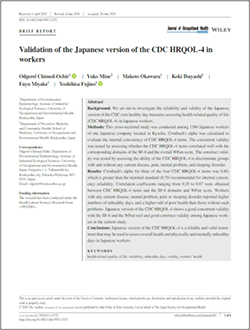#0066 Validation of the Japanese version of the CDC HRQOL-4 in workers

American-made Health-related Quality of Life Test Can Be Administered Successfully to Japanese Citizens
A person’s health is usually measured by their mortality rate, which is the average number of years they are expected to live, and their morbidity rate, which is a measurement of a disease’s effect on their life. These numbers do not take into account other important factors like physical and cognitive functioning, and the person’s own experience about their health.
Recently, the emerging concept called health-related quality of life (HRQOL) has attempted to connect the dots between a patient or a population’s perception of their health and the health conditions that accompany an illness.
Initially developed by the US-based Center for Disease Control and Prevention (CDC), the CDC HRQOL-4 tool has been adopted by other countries, including Japan, to assess the health status of its population. To establish its validity, we attempted to verify if this Japanese version of the CDC HRQOL-4 can accurately and reliably describe Japanese workers’ overall health and their experiences of the days when they are physically and mentally ill.
Using a questionnaire survey approach to which more than 1300 people responded, we found that participants had no difficulty answering the items on the Japanese version of the CDC HRQOL-4. This demonstrated that the measure is highly feasible. The quality of the measurement, termed reliability, and its construct validity, which is how well a test measures what it is supposed to be measuring, were good as well. For instance, when comparing workers who currently had a disease, mental problem, pain, or sleeping disorder with those who did not, we found that the highest differences were between those with and without a mental problem or sleeping disorder. This is in line with previous studies which found that people with any disease or chronic condition had significantly more physically and mentally unhealthy days than those without any disease.
We also investigated how the CDC HRQOL-4 measure compared to well-established and proven measures like the SF(short form)-8 Health Survey, which monitors physical and mental health, and the Work Functioning Impairment Scale (WFun), which assesses how health problems impact working ability. We found that the CDC HRQOL-4 compared favorably with the SF-8 and WFun measures.
We can confidently say that the Japanese version of the CDC HRQOL-4 is a valid and reliable measure to track workers’ health in the country. Its user friendliness means occupational physicians should find no problem in using it to ensure their patients’ wellbeing.

Link to the original journal article:
https://onlinelibrary.wiley.com/doi/10.1002/1348-9585.12152
Title of the paper:
Validation of the Japanese version of the CDC HRQOL-4 in workers
Authors:
Odgerel Chimed-Ochir, Yuko Mine, Makoto Okawara, Koki Ibayashi, Fuyu Miyake, Yoshihisa Fujino




